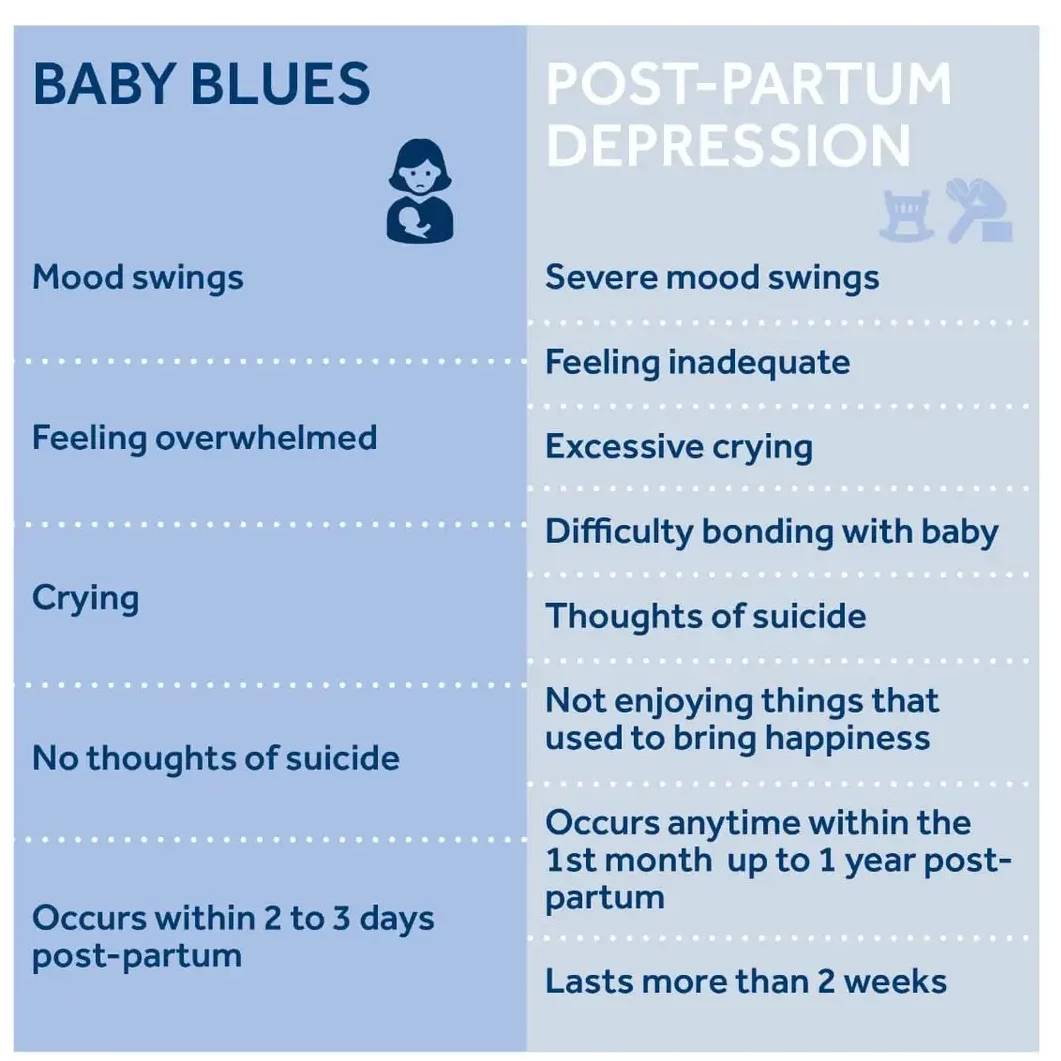Hey there, new mumma!
Congratulations on the arrival of your precious little bundle of joy.
While this is undoubtedly an exciting time, the first few weeks after childbirth can be a bit of a rollercoaster ride.
You may find yourself experiencing mood swings, feeling tearful, and having trouble sleeping. Don’t worry, though, you’re not alone — these are all common symptoms of baby blues.
In this article, we’ll provide you with 11 simple steps to help you overcome the baby blues and enjoy a happier postpartum period.
We’ll also take a closer look at the difference between baby blues and postpartum depression, and explain why it’s so important to take care of yourself during this time.
So, let’s get started.
What is Baby Blues?
You’ve just given birth and you’re feeling all the emotions — sad, anxious, and overwhelmed like you’re on an emotional rollercoaster.
Don’t worry, mumma, you’re not alone.
Up to 80% of new mothers experience what’s called the baby blues.
It’s like an emotional hangover that kicks in a few days after birth and can last up to two weeks. Symptoms include crying, feeling overwhelmed, fatigue, and trouble sleeping.
But here’s the good news — it’s totally normal and usually goes away on its own without medical intervention.
This is usually caused by your hormones going wild and the stress of adjusting to life with a newborn.
Just keep an eye on your symptoms and if they don’t improve or are still hanging around after two weeks, reach out to your healthcare provider, as it could be a sign of postpartum depression.

What is the Difference between Baby Blues and Postpartum Depression?
While the baby blues can make you feel like you’re on a bit of an emotional rollercoaster after giving birth, postpartum depression is a more serious condition that affects around 15% of mums, whether it’s their first or fifth baby.
Unlike the baby blues, postpartum depression symptoms can last for several months or even up to a year after giving birth.
But it’s not just mummas that can experience postpartum depression; Studies show that 1 in 10 partners experience postpartum depression, so make sure you’re watching out for each other.
Symptoms of postpartum depression can include feelings of hopelessness, guilt, and worthlessness, as well as a loss of interest in activities you once enjoyed.
Postpartum depression can also make it tough to bond with your baby, and you may experience changes in appetite, sleeping patterns, and energy levels.
It’s super important to recognise the difference between the two and seek help if you’re not feeling like yourself.
It’s quite common for partners to recognise the change and raise concerns because we don’t always realise whats happening.
Both your partner and your healthcare provider can help you create a plan to manage your symptoms and provide appropriate treatment if needed.
Remember, asking for help is a sign of strength.

11 Simple Steps to Overcome the Baby Blues
All those wild hormones can make you feel like you don’t even recognise yourself.
But don’t worry, we’ve got you covered.
We’ve put together a list of 11 simple steps to help you overcome the baby blues and get back to feeling like yourself again.
- Surround yourself with supportive people
Talk to your partner, family, and friends about what you’re going through. Sometimes just having someone to listen to can make a big difference.
There are also many support lines and networks that you can access if you feel like talking to those close to you isn’t enough.
- Take breaks and time for yourself
It’s important to remember that you’re more than just a mum — you’re a person with needs, too.
Try to take some time every day to do something you enjoy, whether it’s reading a book, taking a bath, or just going for a walk.
- Practise self-care
This means taking care of yourself physically, emotionally, and mentally.
Eat nutritious foods, stay hydrated, and try to exercise lightly when you can – talk to your postpartum physiotherapist or doctor to see what you’re able to do in the first couple of weeks.
Take care of your emotional and mental health by practising relaxation techniques like meditation or deep breathing exercises.
- Get enough sleep
This can be tough with a newborn, but try to prioritise getting as much rest as you can.
Take naps when your baby is sleeping, and consider asking for help with night-time feedings.
- Reach out for help if needed
Don’t be afraid to ask for help if you need it.
Whether it’s from your healthcare provider or a friend, there’s no shame in seeking support.
- Consider a support group
Talking to other mums who are going through similar experiences can be incredibly helpful.
Look for local support groups or online communities where you can connect with other new mums.
- Stay active
Exercise can help boost your mood and energy levels.
Increasing your vitamin D levels has been shown to increase serotonin release (the happy hormone), and decrease inflammation and the likelihood of developing postpartum depression.
Even just a short walk outside can make a big difference.
- Keep a journal
Writing down your thoughts and feelings can be a great way to process what you’re going through.
It can also be helpful to look back on later to track your progress.
- Focus on the positive
It can be easy to get caught up in negative thoughts but try to focus on the positive things in your life.
Make a gratitude list every day, and remind yourself of the things you’re grateful for.
- Give yourself time
Remember that adjusting to life with a newborn takes time.
Be patient with yourself, and don’t be too hard on yourself if things don’t go as planned.
You’re doing the best you can, and that’s all that matters.
- Hire a doula
Hiring a virtual doula, or an in-person doula, can provide immense benefits for new mothers experiencing baby blues.
They’re like your best friend who knows everything there is to know about pregancy, birth, labour, caring for a baby, breastfeeding and beyond.
A postpartum doula can offer practical support and advice on baby care, while a nighttime doula can give the mother much-needed rest.
A sibling doula can help older children adjust to the new baby, and a virtual doula can offer emotional support and guidance from a distance.
And thats not even the best part. They can also help you with cleaning, meal preparation and they can provide support to your partner as well.
And if youre feeling like you are falling deeper into a downspiral of emotions, they know exactly what to watch out for and what to do.
They’re there for you when you need them.
With a doula’s help, new mothers can navigate the postpartum period with greater ease and confidence.

FAQs
Baby blues meaning? And are baby blues normal?
“Baby blues” is a term used to describe the mild and temporary mood swings that many new moms experience after giving birth.
It’s completely normal and affects up to 80% of new mothers. You might feel sad, anxious, irritable, or just not like yourself.
Why does the baby blues happen?
The baby blues happen due to a mix of factors, including hormonal changes, exhaustion, and the emotional stress of caring for a new baby.
Hormones like oestrogen, progesterone, and oxytocin can fluctuate wildly during and after pregnancy, which can contribute to these feelings.
When does the baby blues start?
Typically, the baby blues start a few days after giving birth and can last up to two weeks.
Symptoms tend to be the strongest around day four or five after birth and then gradually get better.
Will the baby blues go away?
The good news is that the baby blues will usually go away on their own within two weeks.
But if your symptoms persist or get worse, it’s important to talk to a healthcare professional as it could be a sign of postpartum depression.
Is baby blues the same as postpartum depression?
Postpartum depression is different from baby blues because it’s more severe and lasts longer.
The symptoms are similar but more intense and can include things like feelings of hopelessness, loss of interest in things you used to enjoy, and changes in your appetite or sleep patterns.
It’s important to seek medical attention if you think you might have postpartum depression, as it can be treated with therapy, medication, or a combination of both.
Remember, it’s okay to ask for help and take care of yourself during this time.
What are some help lines that i can call if im experiencing Postpatum Depression symptoms?
Depending on where you are located in the world, there are a range of helplines and support groups that you can contact to seek help.
INTERNATIONAL: Postpartuam support international
AUSTRALIA: PANDA national helpline
UK: Family Action – Family line
USA: National Maternal Mental Health Hotline
Don’t Let the Baby Blues Bring You Down
We know adjusting to life with your new little one can be challenging, and it’s totally normal to experience the baby blues.
Remember, though, that these blues are just a temporary phase that’ll pass.
It’s crucial to recognise the difference between baby blues and postpartum depression, and to reach out for help if needed.
And don’t forget to prioritise self-care during this time, whether it’s taking time for yourself, staying active, or considering hiring a doula.
Just remember that you’re not alone, and seeking support is a sign of strength.
With the right tools and help, you can get through the baby blues and enjoy this special time with your new family.


